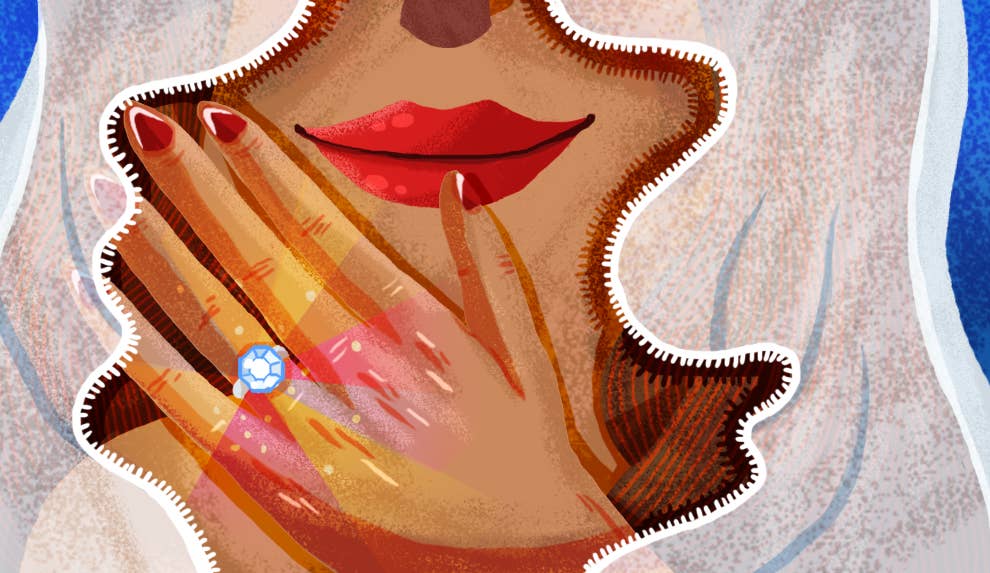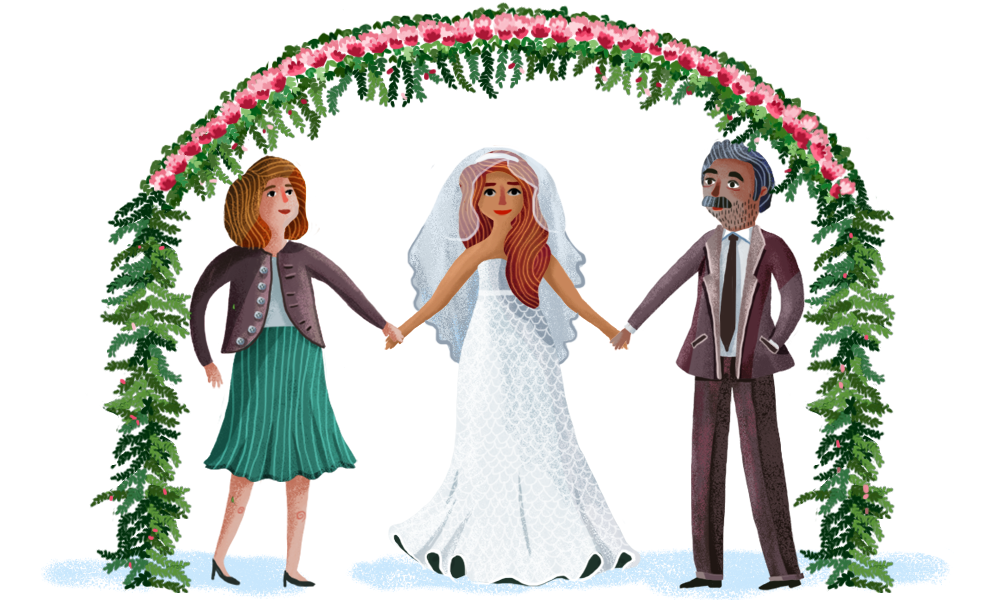
“You wear red lipstick because you want men to think of your vulva.”
As far as first words from a stranger’s mouth goes, these took the biscuit for an entire lifetime. It was 2011, and I was in my university pub, chatting to a friend, when the director of a play he’d recently been cast in appeared by his side. She didn't waste time before making character work of my makeup choice.
“I see it all the time,” the director continued, pursing her own thin, bare lips in disapproval, “It’s…attention-seeking.”
Of course, I was mortified. I’ve often worn red lipstick when I’ve wanted to feel confident, but I can honestly tell you that never have I ever looked in the mirror after application and thought to myself, Yes! Now ALL the men I meet will think about my vagina!
I didn’t realise at the time, but these words would ring in my head years later at my wedding makeup trial. The traditional bridal pink lip washed me out, while the bold, bright red looked fantastic – it warmed my mixed-race skin tone and suited my 1930s waves. But I hesitated. It wasn’t just the obnoxious woman who brought my vulva into a conversation in a pub. I thought too of all of the wedding magazines, and fake brides and Pinterest boards with pretty blondes and baby-pink lips.
And then I thought, Fuck it. Red, please.
From there on out, I was on a roll.

I should say early on that I am not traditionally a rule-breaker. I sat on the front row in school, and even the word "bloody" was classed as a banned and offensive swearword in my house. I’d been brought up to believe that rules kept you safe in multiple different ways. The rules my parents gave me – like not playing with matches or drinking swimming pool water – are pretty legit. Any rule that prevents you from being on fire or having the squits is fine by me.
But what about all those other rules, the ones that keep us neither safe nor happy? Such as the societal standards that make up an nonsensical but well-worn book of what women should and should not do. Ill-informed rules that come from the pages of magazine quizzes and the mouths of popular kids – or over-opinionated middle-aged theatre directors in pubs, for that matter. Yes, childhood and teenagehood are a rollercoaster of rules. But being a woman organising a wedding? That turned out to be a bloody theme park.
Over the 16 months my fiancé and I were engaged, I consumed the usual diet of media-made info. I attended wedding shows, bought extortionately priced magazines, and ogled blogs and vlogs. But the more I did, the more I felt totally overwhelmed. And the more I realised that there were a whole host of wedding traditions and rules that my husband-to-be and I just weren’t going to be able to comfortably adhere too. Some were outdated but relatively harmless, while others were downright misogynistic. There was a particularly high trend of inequality weighted in the favour of the men.
The first issue? The traditional giving away of the daughter by the dad. From the dawn of time (well, marriage) through to now, this remains an act of handing over ownership.
Now, witchhunters, put down your flaming stakes for a minute. Let me clarify. I do not think that having your father walk you down the aisle these days is akin to him selling his daughter like a cow at a market. In fact, in this day and age, I find it remarkably endearing. But that’s because we are excellent at taking traditions and giving them a modern twist. Bonfire Night began as a group of people re-enacting burning a man alive and celebrating it, for goodness' sake. Nowadays, many brides see that what their fathers are giving away is responsibility for their daughter. That the father looks the soon-to-be husband in the eye and says, "Look after my baby girl." It’s a beautiful thing.
But for me, any responsibility of me belongs to both my father and mother. My mother deserved to do that final walk as an unmarried woman with me as much as my dad did. She deserved her few minutes of clutching my hand, guiding me, whispering encouragements in my ear. Retrospectively, the aisle walk was my favourite part of the whole day, and my lovely and equally important mum got to experience that with me.

It wasn’t just a traditional father-daughter aisle walk that we rejected though. As a writer, words mean so much to me. I hated the part of our vows that require us to swear in the eyes of the law, “All that I am and all that I have is yours." It echoed too much of calling your partner your "other half", a phrase I’ve always disliked. I’m one whole person without my husband. I was before, and I will be if there is ever an after. All that I am is not his. My fiancé agreed: He wanted us to do things our way, to make our own rules. He wanted our traditions, not anyone else’s. So we shuffled the phrasing of this part of the ceremony around, putting our foot down when the flustered registrar tried to convince us to keep it as it was, and it meant both of us were able to say every single part with total truthfulness. We both know that the last slice of pizza on a Friday night is all mine, and I'm sorry, but I'm not willing to lie about that in the eyes of the law.
There was another ceremony-related issue that we came across, this time of an unarguably outdated and misogynistic nature. Ten minutes before our wedding ceremony – which took place in 2016 – I was asked my father’s name and occupation, but not my mother’s. My fiancé received the same treatment. Apparently this step is due to be phased out soon, and thank god for that. Asking me my dad’s name I can just about stomach, but his job? Someone stop the wedding, I appear to have travelled back 100 years.
There is no solution to this at the moment, but we got lucky. We’d decided a few weeks before to make our mothers our witnesses. So, though not the way I would want it, our certificates have both sets of parents' names on. Damn right.

As it turned out, it wasn’t just the legal bit of the wedding that was riddled with outdated rules and no-longer-relevant traditions. The reception arrived, and we took more than a few guests by surprise with the wedding speeches.
The father-of-the-bride speech and the groomsmen speech are the two most important speeches of the day, right? The men’s speeches are the ones everyone gets all weepy over, the ones we see in the movies, the ones the millions of internet guides are made for.
Well, frankly, screw that. No one guest was more important than another that day, and by that same rule, no speech could be more important. So my father and my brother-in-law, our best man, got their time, and their speeches were perfect. But alongside that, dotted through the day, four women spoke. The entire party got to hear from my mother; my Auntie, who also sang; and my chief bridesmaid (who was asked why she was speaking more times than either of us would have liked. Her response? “Of course I’m speaking, it’s my best friend's wedding.”).
The fourth woman was me, but you could probably see that one coming.
Why? Because in the century I live in, women are no longer the silent, demure type. They’re not ornaments. They are officially allowed to speak at social functions, and thank fuck for that.
In the end, my new husband and I want a marriage that is about equality. One where we will split nappy-changing, rent, housework, even our pizzas (maybe…one day) in half. So for our wedding day to have been anything less than balanced and equal would just not have been right. It wouldn't have reflected our beliefs or relationship thus far. And what could be more important to represent than those two things on the day we became wife and husband?
On our wedding day, both my mother and my father gave me away, and my fiancé and I said words to each other that we truly believed in. We found a way around the exclusion of our mothers from our marriage certificates. The people who deserved to have a voice had one, irrespective of their gender. And – if I do say so myself – my vulva-red lips looked fabulous.
